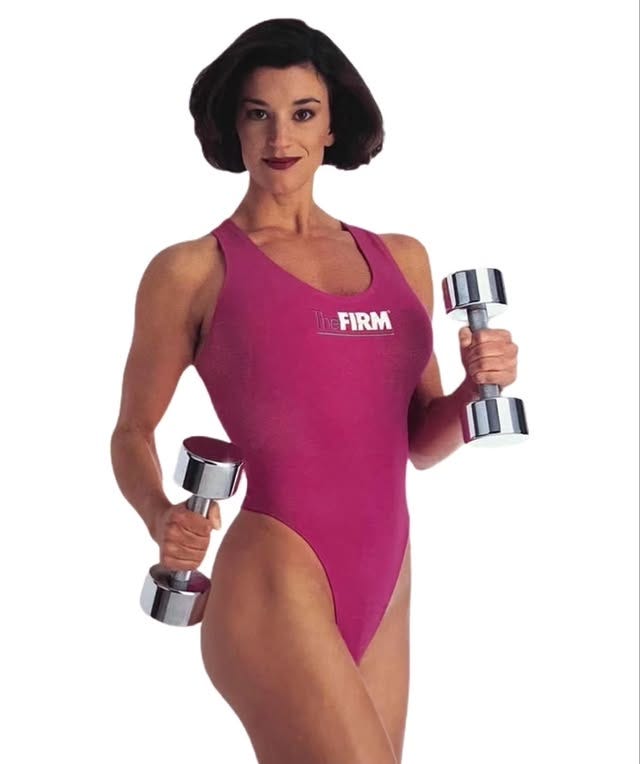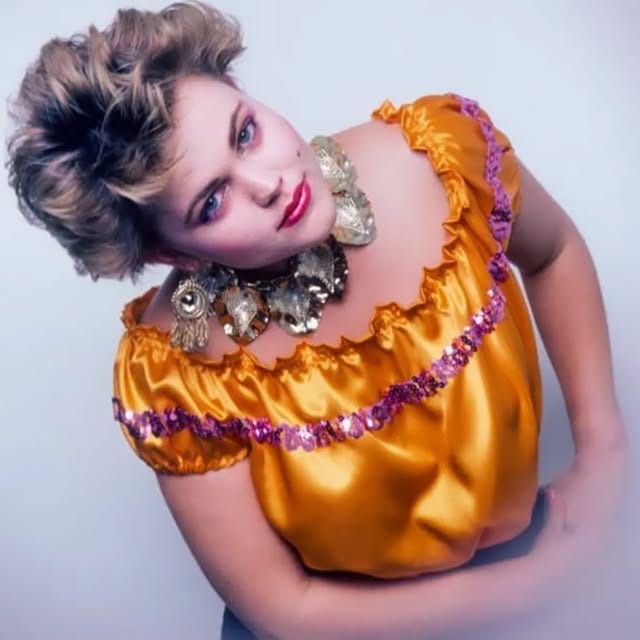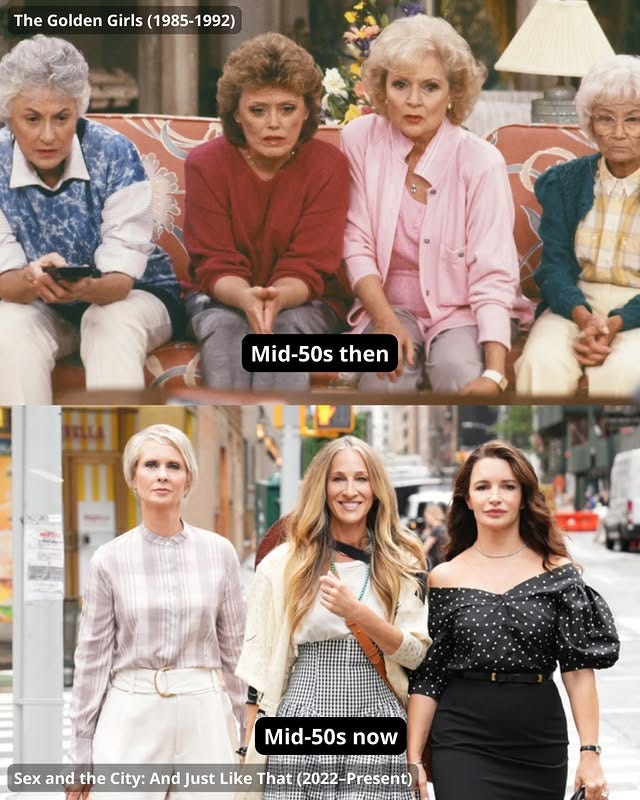Hello WNVM-ers,
First off, a huge welcome (hello, it’s Cheryl and Fawnia) to new subscribers! This past week we surpassed 1,000 subscribers, which is totally surreal. We are so grateful that you read our long-ass posts every week and are sticking around with us as we iterate and grow.
This week I (Cheryl!) am tackling the multifactorial reasons that I think our generation will never be free of diet culture. Heck, I’m not sure anyone ever will be. But with a new focus on the “meno-belly,” and our same-aged celebs thinner than they have ever been, it’s challenging to have a body right now. It’s a fraught area to tread, and I welcome your thoughts and critiques.
Finally, Duran Duran launches something no one asked for, and Fawnia rounds up the Kea-news of the week and asks if Pacey Witter is reading Whatever Nevermind.
You may need to read this in your browser so it doesn’t cut off.
Let Me Hear Your Body Talk
We’re never going to escape the pressure to be super thin, are we?
By Cheryl

I recently saw a SlimFast ad from a few years ago that brought back for me the chalky, chemical-tasting shame that’s imbued in the product. I used to buy it in high school with my fast food job money.
In the ad, a cheery lady, complete with a perm wig from the ‘80s, says, “Radical!” and meets up with a modern woman. Modern Lady informs her that SlimFast is still here, but there are also cool new diet words like “intermittent fasting” and “keto”!
At the end, Modern Lady says to Inaccurate-‘80s-Perm Lady, “Welcome to the future, or, uh, the present.”
Very on the nose. A generational survey from 2024 reveals that people older than 45 turn to SlimFast as a dieting option more than other age groups do. That commercial was meant for us.
Diet culture has followed us to menopause and middle age in the old familiar ways — but in some new devious ones, too. We can blame the monetization of menopause, the popularity of weight loss drugs, the ubiquity of social media, and the aesthetic pressures exerted by celebrity culture. It all makes for a really sludgy midlife weight loss shake.
“Midlife body image issues have been around for a long time, but not to the critical extent that they are today,” says Dr. Margo Maine, a clinical psychologist in Hartford, CT, who has treated people with eating disorders for 40 years. She specializes in older women and is the author of the 2016 book Pursuing Perfection: Eating Disorders, Body Myths, and Women at Midlife and Beyond. She estimates she sees more older women for treatment than she did before the advent of Instagram 15 years ago.
Maine notes that body image issues, disordered eating, and full-blown eating disorders peak at puberty and again at menopause.
“We understand why adolescents have so much vulnerability to body image issues, but we've not taken much time to understand the adult woman,” Maine says.
Meno-Belly is the New Muffin Top
We are in a golden age of menopause awareness, but there’s still a data and expertise void around it. There is disagreement about how to treat it and too few practitioners who feel comfortable doing so.
With the exception of hot flashes, no symptom gets as much attention as the dreaded meno-belly, which is mentioned in almost every single article about menopause. It’s a legitimate phenomenon: Because of hormonal changes, fat gets redistributed from hips and thighs to the lower belly, often accompanied by general weight gain, along with some muscle loss.
As more of Gen X enters peri- and menopause, we are being hammered with the idea that conquering the meno-belly is the last quest of the adventure game called “Being a Woman.” It was even a storyline on the “Sex and the City” spin-off “And Just Like That,” as Charlotte (Kristin Davis) deals with a (non-existent) belly.
Here’s Google search data for the phrase “menopause belly,” starting in 2004. It’s definitely a hot topic:
About 70% of menopausal women have “excessive weight in their mid-section,” according to a 2021 report. Probably not coincidentally, about the same percentage of midlife women are unhappy with their weight, according to a study cited by the National Eating Disorders Association.
There is evidence that this belly fat might be associated with cardiovascular risk factors and can potentially put a person at risk for diabetes and other metabolic problems. But there is still so much we don’t know. There are lots of factors that contribute to this weight gain, like normal aging, sleep, amount of muscle mass you have, genetics, and stress. And to be clear, good nutrition and exercise is important for older women.
But please allow me to be a little flippant here: Women outlive men by 5.8 years, a gap that has been widening since 2010, according to JAMA. So how deadly is that belly, really?
But the belly is visible and easy to focus on, and I can attest that having one is upsetting. Maybe I’ll get coronary disease! Clothes fit weird! It doesn’t feel good! Search for meno-belly information, and it leads to a site like Women’s Health Network, which looks educational, but really wants to sell you $93 supplements using fear-mongering language like “flashing red flag.” (No, they do not work.) It’s a slippery slope from protecting health to full-blown diet culture, since people are vulnerable.
“We Didn’t Start the Fire”
Calories have been burning since the world’s been turning. “By the early twentieth century, America had a firmly entrenched dieting culture,” according to a 2008 article in the Journal of the History of Medicine and Allied Health Sciences.
Media and pop culture in the ‘80s was diabolically fatphobic, leading to a creative and absurd ramp-up in weight loss methodologies and a new world of celebrity trainers. Then came the ‘90s, which were somehow even worse, with its fetishization of flat abs and heroin chic. A lot of millennials have written about how traumatizing this time period was for them, but I felt like a grizzled general of the diet and exercise trenches by that point.
A sampling (read this list to the tune of REM’s “It’s the End of the World As We Know It”):
Jane Fonda, Jazzercise, cabbage soup, cottage cheese, Lean Cuisine
Fen-Phen, Thigh Master, spin — DE-NISE AUS-TIN,
Elle Macpherson, Jenny Craig and Billy Blanks
Richard Simmons, grapefruit, Snackwell’s, the Zone
The Beverly Hills, Master Cleanse, step, Abs of Steel
(Fine, I know it doesn’t rhyme.)
Elle Macpherson sells supplements now, including one for menopause. Cottage cheese has never been more popular. Denise Austin is still around, doing a nostalgia ad with SlimFast and, yep, menopause belly workouts:
A survey from 2019 found that Gen X cares about healthy foods and exercise to decrease cancer risk — but also? We are “much more focused on weight loss than other age groups.” You don’t say!
Now is a good time to mention that I’m an able-bodied white woman who is not and has never been fat; I fit into standard-sized clothing and have never been discriminated against because of my size. I have access to good health care, therapy, and am financially comfortable. I’m privileged in countless ways. But I can’t remember a time when I have gone more than a few days without thinking about my body shape or size, and I’ve definitely spread diet culture messaging personally.
It’s also important to acknowledge that racism plays a role in diet culture and fatphobia, and that thin white women have regularly been held up as a beauty ideal for centuries, due to colonization and white western imperialism. Plus, Black women with eating disorders often aren’t recognized or treated effectively, and Black women spend a longer time in perimenopause and suffer more symptoms, per the NYT. Oh, and let’s not forget the outsize role the patriarchy plays in diet culture.
Celebrities Are Both the Victims and the Perpetrators
All the celeb memoirs I’ve been listening to lately have been stark snapshots of the body culture of the ‘80s and ‘90s. Pick a female star from the era and they most likely grappled with an eating disorder, over-exercising, or fat-shaming. It explains a lot about how our celebrities became vehicles to perpetuate thinness.
Demi Moore had an exercise “obsession.” Belinda Carlisle’s book was particularly grim, documenting every 20 pound weight loss and gain, the mocking she underwent as a child, and the constant documentation of her weight in the press.
For “Friends,” Jennifer Aniston “had to lose 30 pounds if she wanted to stay in Hollywood,” per the book Generation Friends: An Inside Look at the Show That Defined a Television Era by Saul Austerlitz (friend of WNVM at the Ministry of Pop Culture). She allegedly ate the same salad everyday for 10 years.
We can’t unpack the impact on celebs of the era without mentioning Oprah. From wheeling that wagon of fat onstage to becoming a Weight Watchers investor, she is the most visible example of someone who was really stigmatized because of her weight and then spread that messaging from her very large platform. She has since addressed her role in diet culture. (This piece does a good job of explaining all the complex forces at work in Oprah’s journey.)
But we haven’t learned, because a litany of Gen X celebs shill weight loss stuff.
Aniston has been working out publicly ever since her “Friends” days, a fixture in fitness magazines. She publicly endorsed the Zone diet in the ‘90s. She is now the paid face/body for Pvolve, a workout modality that recently conducted a weak study suggesting that it’s beneficial for menopausal women.
Drew Barrymore did sponcon for Dr. Kellyann, who sells cleanses, a “belly slimdown,” and a $69 menopause supplement that purports to “promote weight loss,” among other things. Wile Women, a supplement brand co-founded by Judy Greer, sells menopause supplements and a chai mix to stave off sugar cravings.
Halle Berry’s Re-spin platform used to be dedicated to fitness, as she herself has been publicly for many years. Now it provides menopause “health coaching” for $450 for a three month program. Most inexplicably, Rob Lowe has been a spokesperson for Atkins since literally 2018. (Go away and stop annoying us, Rob.)
I have a lot of empathy for celebs whose bodies get picked over as part of their jobs, but selling us stuff to be thinner is not a great way to stop the cycle. To take on some responsibility here, we normies have probably passed a lot on to our kids and Gen Z. I’m sure mine have seen me weighing food, and who knows what they’ve heard me say about my body.
“Face It, Girls. I’m Older and I Have More Insurance”
When I was young, my expectation of menopause and middle age was colored by the “Golden Girls” and the frumpy Kathy Bates character in Fried Green Tomatoes (1991). But middle age has taken on a new aspirational (read: very thin) sheen.
The last year has been a celebration of older women finally getting their due. Angela Bassett won her first Emmy. Halle Berry and Naomi Watts were everywhere online promoting their menopause businesses and various projects. Joan Chen had a triumphant return to our screens, and Jennifer Lopez took a big swing on a new album and movie. Demi Moore’s Oscars run and Nicole Kidman’s renaissance prompted a zillion think pieces patting ourselves on the back as a society for recognizing that women over 50 exist, look good, and, like, do stuff.
But I find it difficult to watch red carpets these days. Many of the few older women we do have as public role models are even thinner than they were in their younger heydays.
“Yes, it's nice that more [older] women are winning awards at those stupid shows, but it's rarely a woman of an average body size,” says Maine.
Then there’s zeitgeisty pop culture like “The White Lotus,” which has inspired wide meme-sharing online. A few weeks ago, a friend posted a shot of a very thin Michelle Monaghan in a bikini with a joke about going on a diet. Writer Mary H.K. Choi clocked the extreme thinness too, in her piece noting the “weaponized white bodies.”
And of course there is the endless speculation about who is on a GLP-1 (the class of weight loss drugs that includes Ozempic) and who isn’t. It’s starting to train our eyes differently. “Really skinny” is the new “skinny.”
The drugs are showing up in the meno-belly battle, too. They have real health benefits, and losing weight can improve menopausal women’s health, as the NYT notes. But, as with hormone therapy, we don’t yet know a ton about long-term effects. And the loss of muscle and bone density, already a risk in menopause, is exacerbated by the drugs.
One woman in the NYT article who was on them said, “...yes, there was health. But when I’m really honest about it, I wanted to be thinner, too.” Girl, I feel this so much.
I’m going to end with a 56-year-old European influencer who I can’t escape in my Instagram feed. At first I thought it was satire or that she was a genius troll. But I’m thinking of her now as our generational id writ large:
She says all the quiet parts that we should have left in a Shape magazine-circa-1996, out loud: “How I get a perfect bikini body,” looking like a 25-year-old, getting a six-pack, being proud of your (low) weight. She is an extreme example, but I don’t see us getting out of this mindset anytime soon.
It makes me want to toss my phone into the Hudson River, but Maine counsels self-kindness.
“It's hard to figure out what is good for us individually when you've never been told that you are good enough, and you've never been told to take care of yourself in a real way other than to spend money on changing your body,” she says. “Because that's the message we always get.”
We are two Gen X journalists who celebrate people of our generation doing cool things, as well as analyze all the '80s and '90s nostalgia in current pop culture, fashion, and beauty. Read more stories like this one here!
You Oughta Know
A Kea-news bonanza out of CinemaCon: There's no keeping the dog-avenging, assassin-with-a-code down (or in the grave), as John Wick: Chapter 5 is a go, as well as an animated prequel. (Does that come with a collectible doll?) Meanwhile, ahead of the spin-off Ballerina’s June premiere, star Ana de Armas remembers meeting Reeves a decade ago and mistakenly telling him that she never saw The Matrix. -FSH [The Hollywood Reporter]
Kea-dendum: Keanu and longtime girlfriend Alexandra Grant were spotted in London holding hands and kissing over wine and oysters. We love love! -CW [People]
Is Joshua Jackson reading Whatever Nevermind?! He’s on “Doctor Odyssey” because he just wants to have fun, and says, “We’re not working on ‘The Pitt.’" (Plus, a cute Don Johnson story.) -FSH [Vulture]
Duran Duran has just released two fragrances with Italian perfume house, Xerjoff. They sell for $339 each and are called Black Moonlight and NeoRio, which comes in your choice of four different neon shades. Other names that were considered: LeWolf, New Musk on Monday, Reflex/Complex, and Ne-Rio-li (OK, I made that last part up.) -CW [Vogue]
On Amy Poehler’s new podcast, “Running Point” showrunner, “The Studio” scene-stealer, and my all-time fave TV bro Ike Barinholtz threw out more than one Rodney Dangerfield reference, nails a Liam Gallagher impression, and deftly works Bull from “Night Court” and Timmy Chalamet into one sentence. -FSH [Good Hang]
Vanderbilt University undergrad and nepo baby Apple Martin wears red Doc Martens oxfords, "steals" all the '90s Calvin Klein that her mom, Gwyneth Paltrow, saved for her, anyway, and wants to be Elle Woods. -FSH [Interview]
Our long national nightmare is over: Madonna and Elton John made up after a decades-long feud. -CW [Instagram]
The trailer for the new Naked Gun movie is out and it actually looks good. Liam Neeson doing slapstick? Amazing. -CW [YouTube]
















I read your entire article and just realized I've been reading it as 'mono-belly' which makes no sense, but nothing in diet culture does. My mom turned 80 yesterday, we're wrapping up our call today and I say I'm going to work out. And she says something like, oh yeah if you work at it, you'll lose weight. And I'm like, I don't care about losing weight, I'm 45, I've had 3 kids, I'm never going to be slim again, I work out to be strong, and she then tells me not to worry, when she got old, the weight just fell off her, and there is no way to get it into her head that I don't care that I'm chubby, being healthy is my goal.
I worry about my weight much more from a health perspective than body shape now - I do a lot of yoga and the difference if I put on a couple of pounds is marked. I can’t move myself properly, my arm muscles don’t support the extra weight confidently and my belly gets in the way. My knees complain! My body tells me when it’s not happy with my weight and it’s that, rather than diet culture that pressures me into being more careful. But, I grew up in a family where it was acceptable to comment on any aspect of each others’ bodies negatively and more than one biscuit was ‘greedy’ - my parents to this day are rake thin. I’m not and I’m ok with it (after years of struggling with body image) but I really do not want a body that my knees can’t hold up.